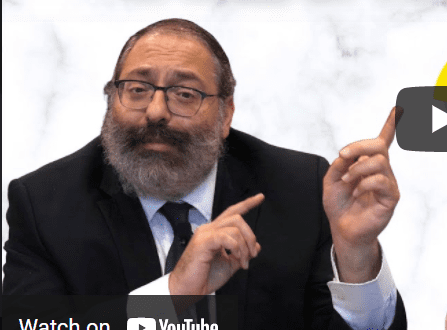On the one-year anniversary of the historic Abraham Accords, popular Rabbi YY Jacobson gave a lecture on how the iconic treaty is precisely what happened in the Bible between Isaac and his brother Ishmael when after being estranged from Abraham, Ishmael eventually reunited with his brother Isaac to bury their father.
Banishment from the household
The rabbi begins his presentation with the Genesis when God told Abraham to listen to Sarah and send Yishmael away:
She said to Avraham, “Cast out that slave-woman and her son, for the son of that slave shall not share in the inheritance with my son Yitzchak.” (Genesis 21:10)
This was a turning point in the contentious relationship between Ishmael and Isaac. According to Rabbi Jacobson, up until that point, Ishmael would try to entice Isaac with idolatry and adultery. Sarah saw what a bad influence Ishmael was on her son and so realized that the best course of action was to banish them from the estate.
‘Coming from coming’?
The rabbi uses a largely overlooked passage to back up his assessment. In Genesis 24, there is a passage that in its original hebrew reads: יִצְחָק בָּא מִבּוֹא.
Literally translated, it means that Isaac is ‘coming from coming from’ the well of lahai-roi:
Yitzchak had just come back from coming of Beer-lahai-roi, for he was settled in the region of the Negev. (Genesis 24:62)
This begs the question: Why would the Torah state that he is coming twice from the well of lahai-roi? An interesting clue is that the well was the same well that Hagar ran away to in Genesis 16 after being overwhelmed by Sarah’s work orders. This is documented in Genesis 16:
Therefore the well was called Beer-lahai-roi; it is between Kadesh and Bered. (Genesis 16:14)
There, Hagar found a resting place where a sympathetic angel heard her story and blessed her son Ishmael that is written several passages beforehand:
The angel of Hashem said to her further, “Behold, you are with child And shall bear a son; You shall call him Ishmael, For Hashem has paid heed to your suffering. (Genesis 16:11)
Later on, when Abraham brings Isaac his wife, Rebecca, Isaac is returning from that same well – a well he lives close to and often frequents.
Yitzchak had just come back from the vicinity of Beer-lahai-roi, for he was settled in the region of the Negev.(Genesis 24:62)
This begs another question; What seems to be Isaac’s seeming obsession with this well?
A place to communicate
According to the famous Torah commentator Rashi, Isaac was actually speaking to both Hagar and Ishmael at the lahai-roi well and trying to reunite Abraham with Hagar. Rashi adds that Isaac’s attempts were successful and that Hagar and Keturah is actually the same person following a name change.
But it wasn’t only Isaac attempting to reconcile with Hagar and Ishmael.

That’s because according to Midrash (a form of literature that interprets and elaborates upon biblical texts) Pirkei Eliezer when Ishmael was sent away, he married a Moabite woman. Abraham later met with this woman. Without revealing that he was Ishmael’s father, Abraham told her that he was thirsty from his long travels and asked her for some water. She denied his request. Realizing she was an unsuitable wife for his estranged son, Abraham told her to relay a message saying: ‘An old man from Canaan came and he says that Ishmael should change the threshold of the home.’
Patimah, Ishmael’s new wife
Ishmael understood the message and that it came from his father, Abraham. Ishmael subsequently divorced her. At that point, Hagar finds a new wife for Ishmael, this time from Egypt named Patimah. Abraham again sojourned to visit Ishmael’s new wife and again, asked her to provide bread and water after complaining of a long journey in the desert. This time, Ishmael’s wife Patimah honored his request.
When that happened, Abraham blessed Ishmael’s home. After Patimah told Ishmael the story of the stranger she met, Ishmael realized that his father, Abraham never stopped loving him.
United in burial
Fast forward to Abraham’s death, the fact that both Isaac and Ishmael buried their father Avraham together shows us that Ishmael repented for enticing him with idolatry and adultery. Additionally, despite being the older brother, Ishmael allowed Isaac to go before him in the burial. That’s why Isaac’s name is mentioned before Ishmael’s:
His sons Yitzchak and Ishmael buried him in the cave of Machpelah, in the field of Ephron son of Zohar the Hittite, facing Mamre, (Genesis 25:9)
Rabbi Jacobson explains that this demonstrates that Abraham’s ultimate vision was one of worldwide reconciliation, more specifically through his sons: Isaac and Ishmael. That is why the rabbi found the ‘Abraham Accords‘ to be such a fitting name for the 2020 treaty between Israel, Bahrain and the UAE. Interestingly, one of the main advisors driving the accords was Avi Berkowitz, whose full name is Avraham, or in English; Abraham.
The shortcode is missing a valid Donation Form ID attribute.




